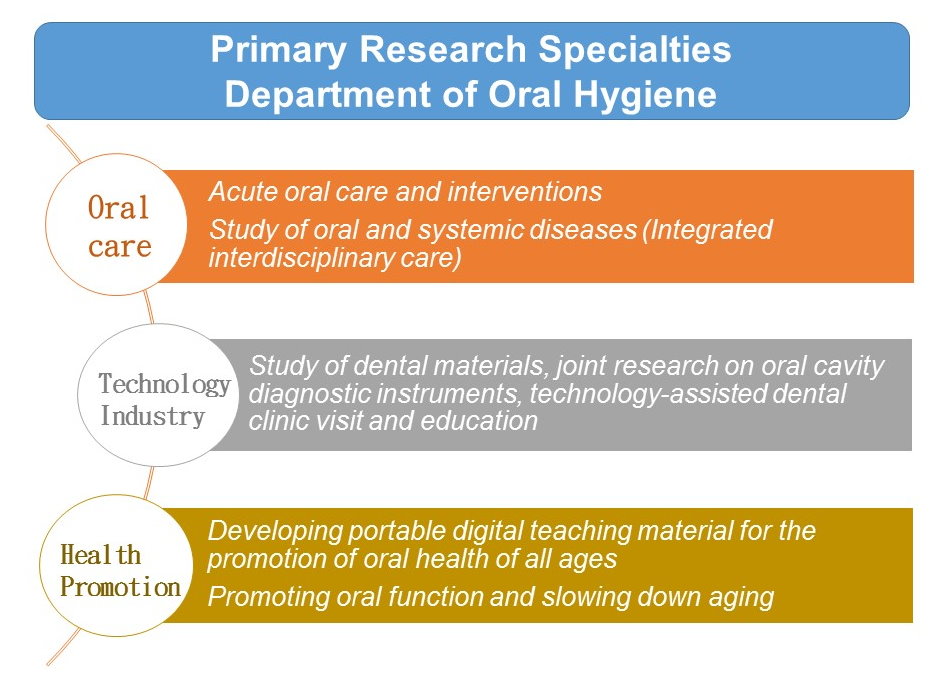Program Objective
The Department of Oral Hygiene hosts three different degree programs: Bachelor's, Master's, and Master's Program for Working Professionals. The Bachelor's Program objectives are to train oral hygiene professionals with oral hygiene education skills, dental medicine assistant skills, preventative oral healthcare skills and research and critical thinking skills. The Master's Program trains expert knowledge and research capability in oral hygiene, professional and research ethics, and practical skills in oral health promotion and policy research. The Master's Program for Working Professionals aims at training multi-faceted expert knowledge and research capability in oral hygiene, ability to analyze problems in and improve the oral hygiene of specific demographics, and practical skills in oral health promotion and policy research.
Program Specialty
Bachelor's Program
In response to current trends and demands and as part of the vision to improve the oral health of Taiwan to be on par with advanced countries in the rest of the world, the Department is the first to offer a four-year program in oral hygiene in Taiwan with the objective of training individuals to gain education, communication, and technical skills in clinical and community oral care and preventative healthcare to become "oral hygiene professionals. "
The Department was established with the mission "To promote of healthcare, education, service, and research in oral health. " The objective of the Department is to train individuals to gain education, communication, and technical skills in clinical and community oral care and preventative healthcare and incorporate them into the growing team of oral healthcare professionals. A generalized curriculum offers students a better perspective of their profession while placing an emphasis on specialization clarifies the students' goals.
The curriculum includes courses in the humanities, natural sciences, fundamental medicine, and clinical dentistry. For oral hygiene, in addition to public health, medical policy, and administration, clinical care is stressed upon by offering internship opportunities on and off campus and in various specialties. The result is a highly knowledgable oral health professional with practical clinical experience. The oral epidemiology education and research group aims to train instructors in oral hygiene and professionals in public oral health for the country. These individuals could then offer their expertise to government health or healthcare institutions. Students are awarded a Bachelor of Science degree upon graduation.
The Department also joined the Asia-Pacific Academic Consortium for Public Health in July, 2002, becoming the only organization out of the 59 from 19 countries to join the Consortium as a public oral health organization, seeking to do more to promote oral health.
Master's Program and Master's Program for Working Professionals
The Department's Master's Program is the only graduate program dedicated to the research of oral health promotion, preventative oral medicine, long-term care and oral care. The goal of the program is to train professional in promotion and betterment oral hygiene, analysis and improvement of oral hygiene and healthcare policy making, and basic research in oral hygiene. The programs train oral hygiene professionals for the country, allowing them to offer their expertise for government health or healthcare institutions.
The Master's Program for Working Professionals began recruitment in 2000, adding diversity to the graduate student population and rounding out the Department's Master's Program. Alumni of the Department can be found in health bureaus and institutions around the country.
Specialty of the Master's Program and Master's Program for Working Professionals
As the society ages, the demand for holistic care gradually increases. Oral hygiene is closely related to the body's systemic diseases, while a collaborative strategy across interdisciplinary teams is needed in the field of long-term care. The program's curriculum includes public dental health and preventative oral medicine in addition to interdisciplinary courses such as long-term care and oral care, and chewing and swallowing difficulties. The integration of fields such as medicine, dentistry, nursing, and rehabilitation can train an oral hygiene professional geared towards holistic care.
Public dental health and preventative oral medicine trains research experts in oral health promotion and public oral health policy. The long-term care and oral care courses aims to train oral care professionals in clinical or community settings that works with the long-term care industry.

